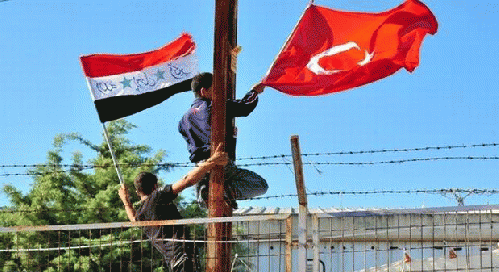Turkey has given permission for the US-NATO coalition to use Turkish airbases at Incirlik, Diyarbakir, Batman and Malatya for coalition aircraft bombing against ISIS. At the same time, Turkey has started on its own to bomb PKK Iraqi Kurds in Northern Iraq. This Turkish move made it clear to the world that the Erdogan government is not focused on fighting ISIS. On the contrary, the Turks have not sealed their border with Syria yet and they keep on buying illegal oil from ISIS. Furthermore the Turks have not done anything yet against the training camps of terrorist groups already settled on its Syrian border.
Turkey's decision to help the coalition seems only motivated by Erdogan's own strategic interests. The main interest is to limit the expansion of armed Kurdish groups along the Turkish border in order to reinforce Erdogan's power.
The Turkish president also proposed the creation of a buffer zone on the border between Syria and Turkey; this buffer zone would be strengthened by a no-fly zone to increase security in the area. The zone will extend forty to fifty kilometers into ISIS-held regions of Aleppo Province in northern Syria. Turkish authorities claimed that Syrian Air Force planes entering the zone would also be targeted. The application of this buffer zone will mean that terrorists such as ISIS will be able to conduct attacks in Syria without being worried about being pursued by Assad's allies.
In addition, this buffer zone will block any attempt by Syrian Kurdish forces to move into Turkish territory and this will allow ISIS or other extremist groups to secure their supply routes through Turkey. The main event that forced Turkey to reconsider its border security policies was the seizure of the border town of Tel Abyad [i] in northern Syria from ISIS on June by Kurdish forces. The fear of increased influence along the border between Syria and Turkey by Kurdish forces have convinced the Turkish government to further engage regarding the Syrian conflict in order to make sure that Turkish's interests are not jeopardized. No doubt this strategy would be even more difficult to carry out with the recent Russian bombings against ISIS.
However, the expansion of Turkey's role in the anti-ISIS coalition will
and has already generated a reaction in the form of terrorist attacks
from extremist groups inside Turkey, like the recent suicide bombing in Ankara
on October 10[ii].
Moreover, thousands of foreign fighters have travelled through Turkey
in order to join ISIS forces in Syria and Iraq, among them over a 1,000
Turkish citizens. All those isolated or organized terrorists represent a huge
threat to Turkey's national security. In the meantime, Turkey also faces troubles
in the Kurdish provinces [iii].
These two threats are the current main challenge that the Turkish people and
the Turkish government will have to face in the coming months.





